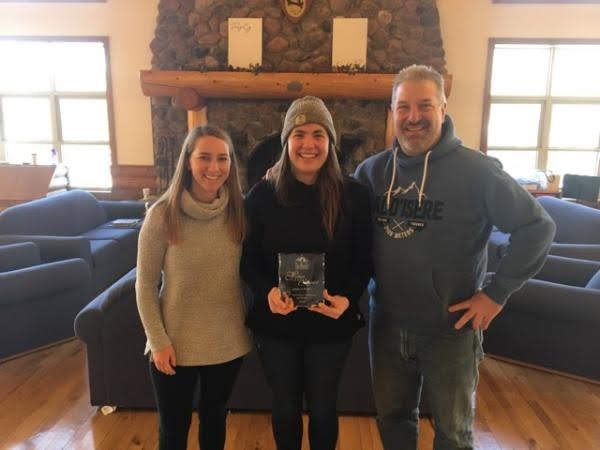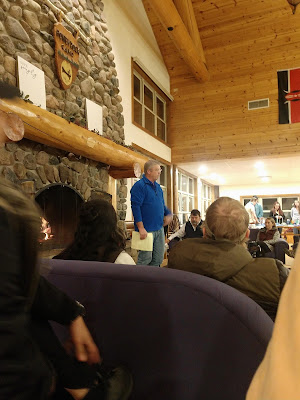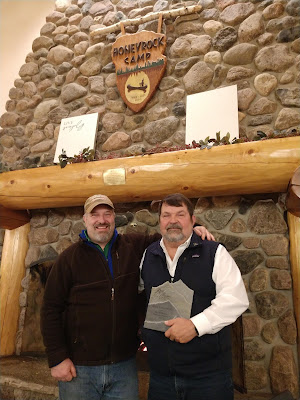 |
| Board President Emily McKenzie, Honorre Jess Port, Award Nominator Michael Odberg |
Wilderness Education Association
We Have Standards
Thursday, May 21, 2020
Reflections from the 2020 Student Award Honree
Wednesday, May 20, 2020
An Uncertain World
 |
| Gabe Garcez received his COE Clinic Certificate from instructors Brad Daniel (left) and Andrew Bobilya (right) at the 2020 ICOL at HoneyRock |
Uncertainty: it is as if the entire world holds its breath as it ruminates on this word. There was
Gabriel Garcez
Coordinator for Bear Adventures at Baylor University
2020 Certified Outdoor Educator Clinic Student
Monday, May 18, 2020
Reflections from the 2020 Paul Petzoldt Award Honoree
 |
| Presented to Mike by long-time WIU colleague and friend, Jeff Tindall. |
Friday, May 15, 2020
Nominate Colleagues for Association Awards Honoring Excellence
In 2018 Dr. Andrew Bobilya received The WEA Certified Outdoor Educator Award at the conference held in Utah. This was meaningful to him because he “believes in the work of the WEA and its potential to improve practice in wilderness education. Because of this and my commitment to integrating WEA curriculum in my courses, it is an honor to be recognized by my peers and the WEA. The award came as a surprise and was encouraging.”
When asked why others should nominate their colleagues and/or peers Andrew stated “These awards offer a wonderful opportunity to highlight the good work our colleagues are doing and to be an encouragement. I encourage all WEA members to consider nominating an individual or organization for at least one award this year.”
Thursday, April 9, 2020
6 Ways to Engage Environmental Integration
by Jess Port, of HoneyRock
Walk with a child into a forest, field, or wetland and you’ll quickly end up squatting down at their level, marveling alongside them at something seemingly insignificant at first glance. Walk with an adult through the same area though, and it’s far less likely that you’ll end up with your shoes kicked off walking through the dirt hunting for bugs. |
| HoneyRock lagoon in snow |
 |
| HoneyRock cross-country skiing |
Having facilitated environmental lessons for a variety of ages from elementary schoolers experiencing the thick woods of Michigan for the first time to college-aged summer wilderness leaders going through training here at HoneyRock, I’ve picked up a few tricks along the way that can help re-kindle that sense of wonder and curiosity that can come with environmental integration in programming.
1. Get on their level
Kids have a unique perspective on nature simply because they are closer to the ground where there are so many things to see! It may look silly to the average passerby but on your next lunch break kneel by the base of a tree or waddle around a little patch of grass in the squatting position and see what you can find to marvel at.2. Tune your senses
One of my favorite activities to facilitate with people to bring greater awareness to their senses is to have them “put their deer ears on.” Sit and listen quietly – how many things can you hear? Can you identify any of the sounds? Now, cup your hands behind your ears to catch those sounds waves better – what do you hear now? Or take a lesson from your dog and dab some water on your upper lip/beneath your nose to amplify your sense of smell.3. Engage creativity
Draw, photograph, paint, or take a rubbing of something you find that intrigues you – keep a naturalist’s notebook or doodle these in the margins of your planner, checklists, or journal. Ask your staff and participants what analogies they can pull from the environment around them that tie into the lessons they are learning through your program.4. Build enthusiasm
If we’re excited, others will be excited. Get stoked about the hard shell of the acorn that withstood hitting you on the head during your run this morning or the blue-colored berries that you found hiding in bushes in your backyard that mash into a purple paste. Share these discoveries with others!5. Slow down and sit
Stare at a one by one square foot for at least five minutes – go for ten or more if you want a challenge. What do you notice? Boredom inspires curiosity, creativity, and observation. Take advantage of it.6. Kick off your shoes – yes, even in the snow!
Feel the earth or snow or grass in between your toes. Feeling like a kid yet? Crab walk across a lawn or forest floor to get the full experience underneath your hands and feet.The winter season here at HoneyRock has provided an excellent space for me to flex these muscles of wonder and curiosity and to develop my observation skills, encouraging me to press further into environmental integration in programming. Maybe it’s because of the quiet and soft light during the long golden hours before a winter afternoon sunset. Or because the landscape feels foreign and new (in an exciting way) when you’re surrounded by snow-covered pine trees towering over you. Or maybe it’s because of the way bird calls echo across the lake. Or the unique places you can access on snowshoes or cross-country skis that you wouldn’t get to on foot in the summer. Whatever it may be, it’s an exciting and unique place to rekindle one’s sense of wonder and curiosity and begin to integrate environmental observations into your life and, eventually, your programming.
Come visit HoneyRock this winter for WEA's 31st International Conference on Outdoor Leadership and re-kindle your wonder and awe!
Learn more about the Environmental Integration standards of WEA’s curriculum.
Thursday, November 7, 2019
Seeking Nominations for Awards Recognizing Excellence in Outdoor Leadership
Why Nominate for WEA Awards
“At this point in time, it is paramount that individuals be recognized. The organization is driven by volunteers who donate significant time and energy into the organization. Nominating those who deserve recognition is a powerful way to honor individuals for their effort and commitment.”
Thursday, October 31, 2019
Who, Me?- Submitting Your Presentation Proposal
Why submit a presentation proposal?
Submitting a presentation proposal can be intimidating at first, but there are a number of reasons to push through the fear (or sloth) and submit. 2020 ICOL submissions close November 1!1. Preparing a presentation proposal requires you to refine your thoughts.
Even the most tried and true ideas or practices merit a closer look. Walking through the mental process of presenting to others allows the opportunity to revisit, revamp, and retool your own ideas.2. Presenting your ideas to others provides feedback, conversation, and networking opportunities.
Those that attend your presentation do so for a reason, often because the topic is interesting or appealing in some way. As a result, you get a room filled with like-minded individuals that are interested in discussing your topic with you!3. Engagement
While you may not feel like an expert on everything, you have something to share or teach someone. Especially for those of us that don’t feel like we have it all figured out, presenting is an important step in moving forward. Engage others with your ideas, get involved in discussion and conversation, ask questions and engage others!4. Build your network
Similar to engaging others, presenting connects you with others and provides easy conversation starters. Conversations lead to friendships, and friendships lead to a professional network that you can call to ask questions, get recommendations, or provide guidance.5. Get the most out of the 2020 ICOL
Presenting allows you to participate on both sides of the conference – as a teacher and a learner. It provides opportunities to invest in others, natural avenues to build relationships, and may unlock funding opportunities through your institution.Don’t hesitate, submit your presentation proposal today!
Reflections from the 2020 Student Award Honree
It was a treat to both attend the WEA conference and help in the background as a HoneyRock grad student/staff member this past spring. This ...

-
It was a treat to both attend the WEA conference and help in the background as a HoneyRock grad student/staff member this past spring. This ...
-
In 2018 Dr. Andrew Bobilya received The WEA Certified Outdoor Educator Award at the conference held in Utah. This was meaningfu...
-
by Jess Port, of HoneyRock Walk with a child into a forest, field, or wetland and you’ll quickly end up squatting down at their level, mar...







